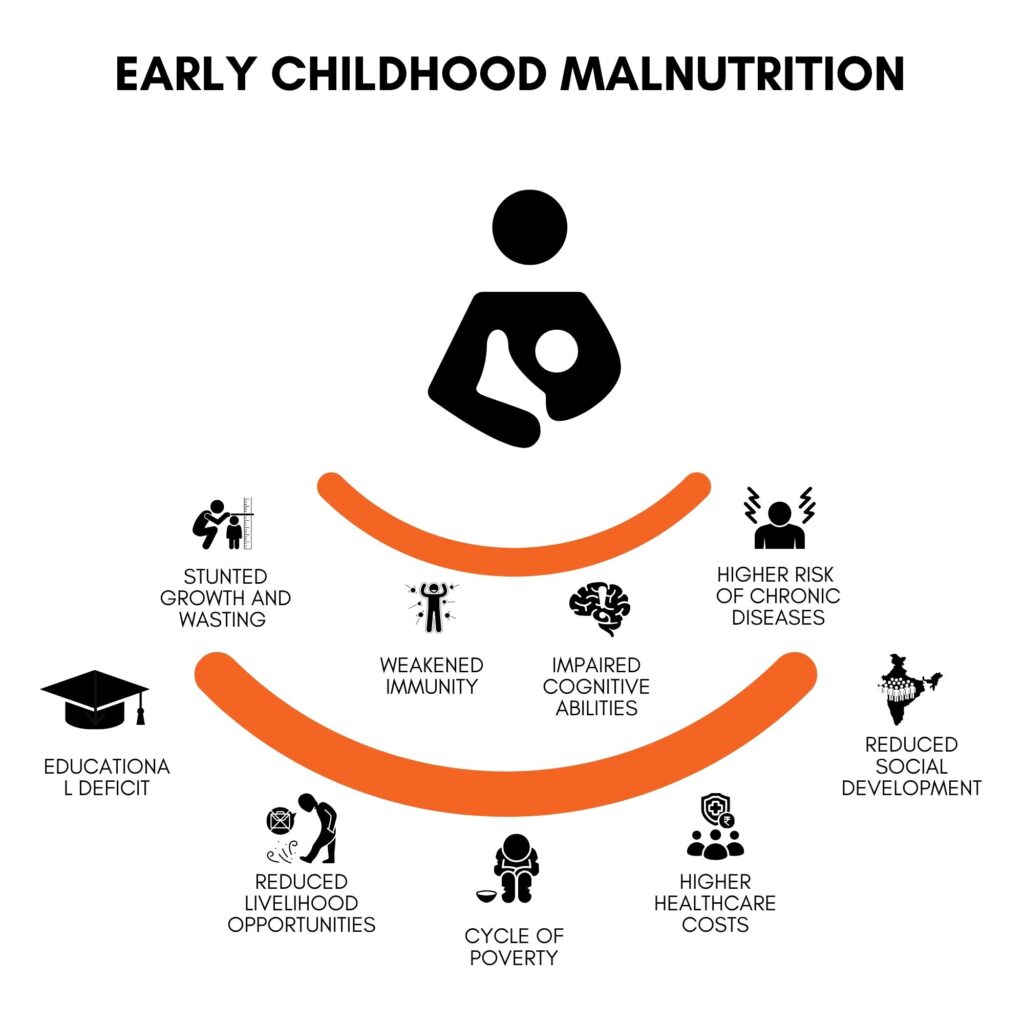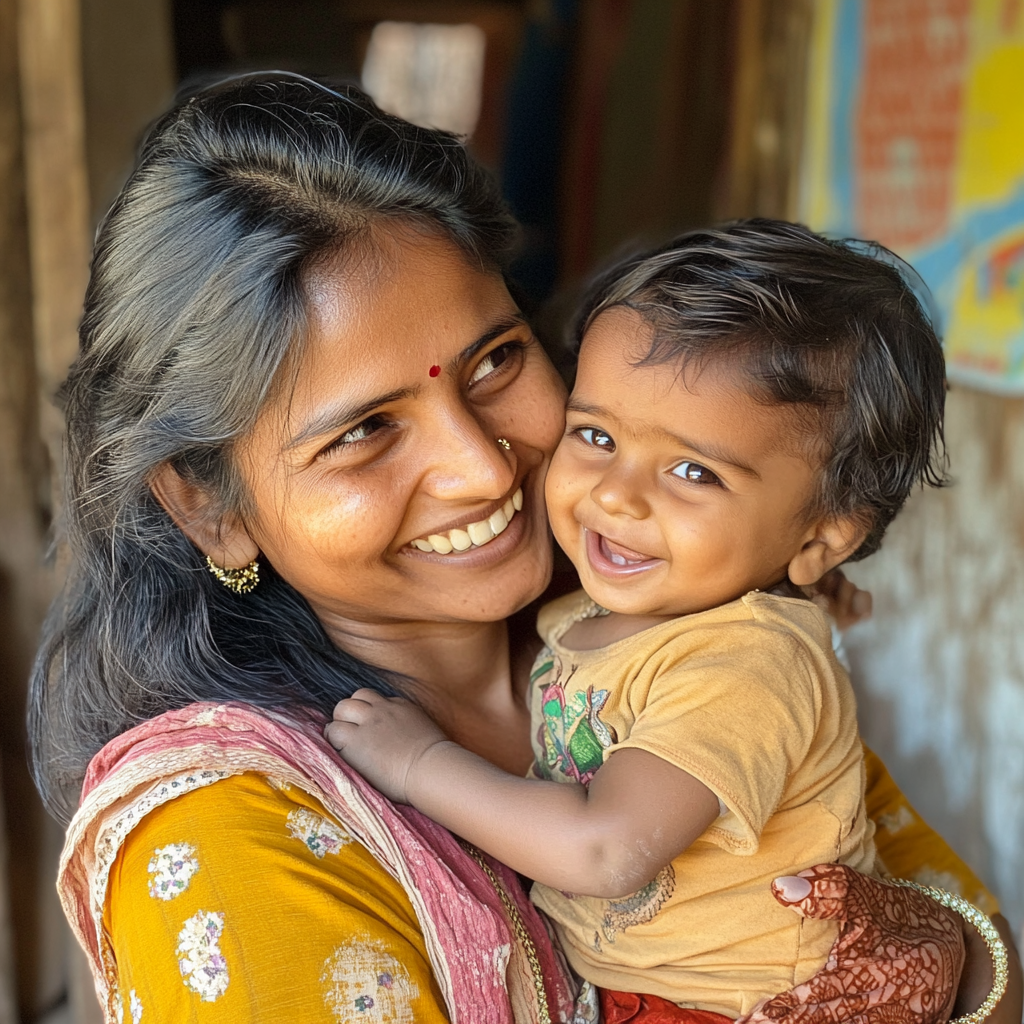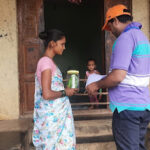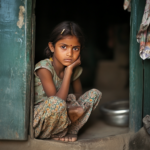The impact of child malnutrition transcends an immediate individual health crisis,
reverberating across generations and influencing the socio-economic future of entire
communities. The cycle of poverty and malnutrition can seem insurmountable in rural
and remote regions of India where access to adequate nutrition remains a significant
challenge. A strategic nutrition interventions offer children more than a chance to
survive—they hold the potential to transform lives and communities.

Education and Productivity: The Link Between Nutrition, Cognitive Development,
and Workforce Potential
Numerous studies have elucidated the link between nutrition, cognitive development,
and educational success. The human brain in its developmental stages needs essential
nutrients for proper formation and structural integrity. Adequate nutrition is crucial for
physical and cognitive development in infants and children.
Poor nutrition during early childhood can lead to stunted growth, weakened immunity,
and impaired cognitive abilities, often translating into lifelong health challenges.
Malnourished children frequently encounter greater learning challenges, which can
manifest as difficulty concentrating, slower cognitive processing, and reduced memory
retention. These factors contribute to poorer academic performance, often resulting in
lower educational attainment and fewer opportunities for career advancement.
In contrast, well-nourished children are better positioned to excel in school, pursue
higher education, and secure rewarding careers. A focus on nutrition not only support
children’s immediate health, but also strengthen their cognitive abilities, which are
critical for long-term economic growth.
Long-Term Impact of Childhood Nutrition: Lowering Healthcare Costs and
Expanding Economic Potential
Over time, the impact of malnourishment and impaired cognitive development extends
beyond the individual; the cumulative effect of inadequate nutrition on education
translates into a workforce with reduced productivity and innovation. This, in turn, limits
the potential for economic growth within communities, perpetuating cycles of poverty
and hindering overall social development.
The health implications of malnutrition also place a heavy burden on public resources.
Higher healthcare needs associated with malnourished populations lead to increased
healthcare costs, straining public systems and diverting funds from other essential
services.
Well-nourished children are more likely to grow into healthy, resilient adults who
contribute positively to their communities, often breaking cycles of poverty and reducing
healthcare costs. By investing in nutrition programs, communities build a foundation for
lasting social and economic progress, creating generations capable of driving
sustainable development and lifting entire populations toward a more prosperous future.

Inter-generational Benefits: A Foundation for Prosperity
Ensuring that today’s children are well-nourished sets the stage for healthier and more
prosperous generations in the future. Children raised in nutritionally stable environments
are more likely to provide similar stability for their o@spring, creating a reinforcing cycle
of health and prosperity across generations.
This inter-generational impact is especially essential in rural India, where poverty and
malnutrition often feed of each other. Through effective nutrition strategies, we can
empower today’s children to rise above poverty, laying the groundwork for healthier, more
prosperous generations to come.
A Holistic Approach to Tackling Malnutrition
Addressing child malnutrition takes more than delivering food—it requires tackling root
causes, promoting healthy behaviours, and driving systemic change. ANNADA’s Three Pillar Model combines nutrition adequacy, awareness, and advocacy, ensuring children
receive fortified, culturally appropriate food while communities gain essential nutrition
education.
By targeting root causes and advocating for lasting change, ANNADA works to break the
cycle of malnutrition, giving every child the chance to grow strong, dream big, and
thrive.
Building a Future where every child thrives
Addressing child malnutrition requires collaboration, innovation, and a strong
commitment to children’s well-being. Investing in early childhood nutrition leads to lower
healthcare costs, improved educational outcomes, and empowered future generations.
Ending child malnutrition calls for support of organizations that take a holistic approach,
ensuring our efforts make a lasting impact on both present and future generations.
Together, we can create a future where no child is left behind, and every child has the
opportunity to thrive.









